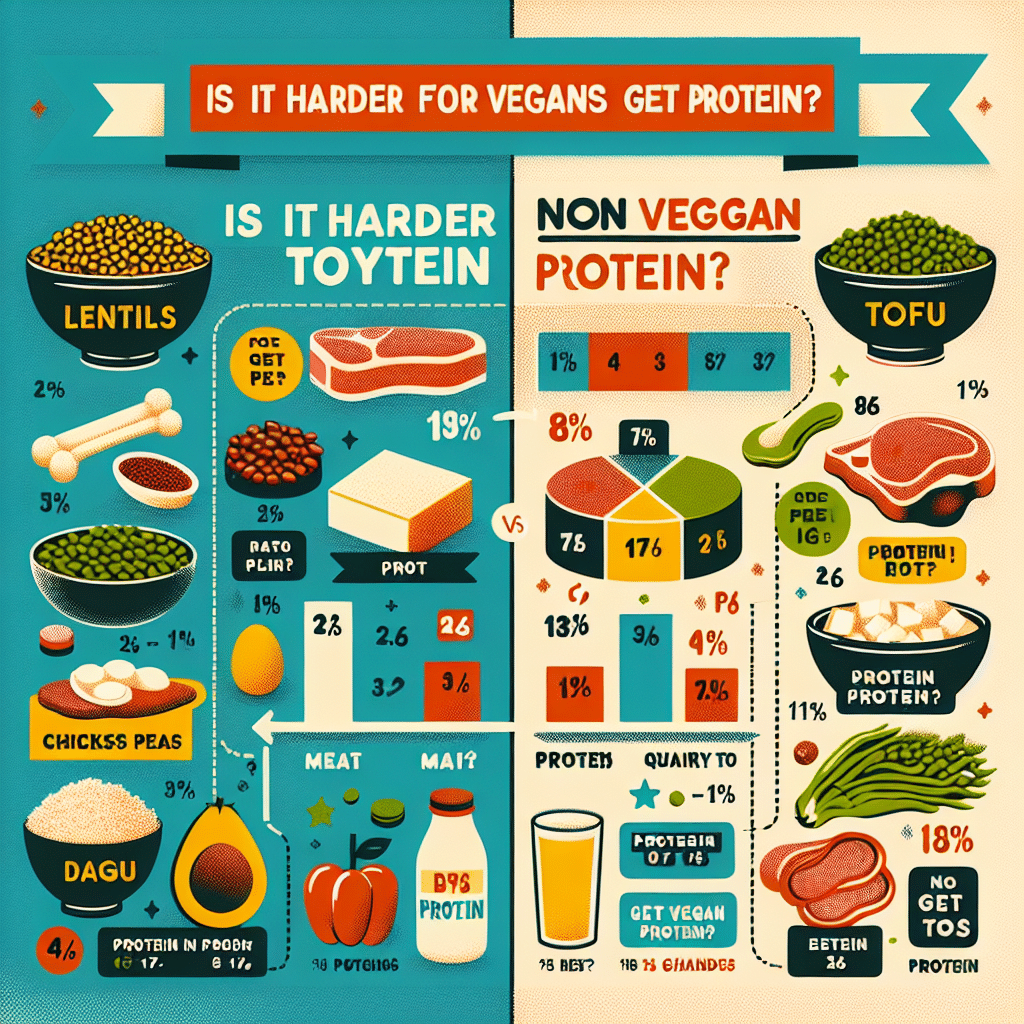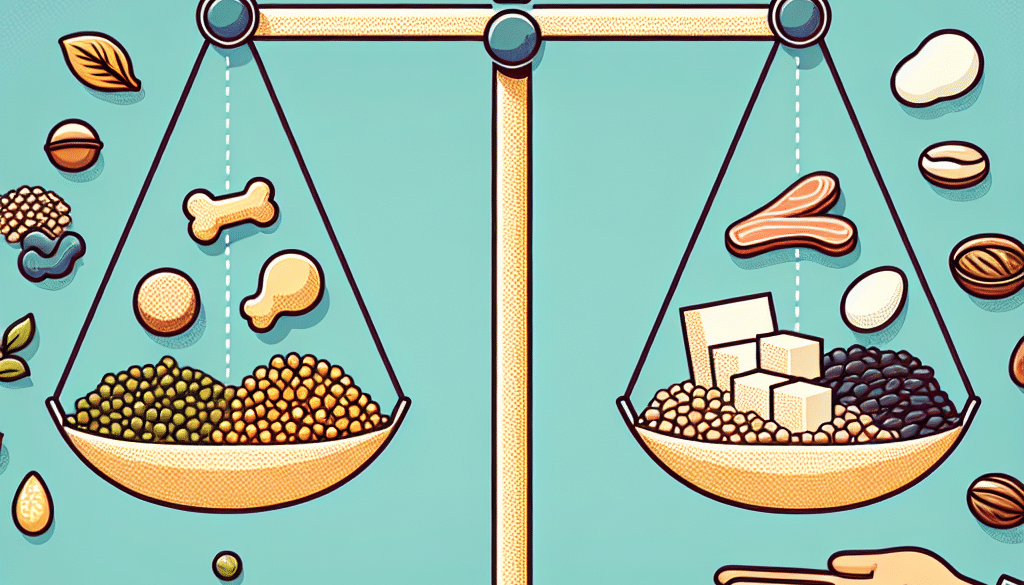Is It Harder For Vegans To Get Protein?
-
Table of Contents
- Vegan Protein Myths Debunked: Is It Really Harder to Get Enough?
- Understanding Protein and Its Importance
- Common Misconceptions About Vegan Protein Sources
- Comparing Plant-Based and Animal-Based Proteins
- Challenges Vegans May Face in Getting Enough Protein
- How Vegans Can Ensure Adequate Protein Intake
- Examples and Case Studies
- Statistics on Vegan Protein Consumption
- Conclusion: Debunking the Protein Myth for Vegans
- ETprotein: Your Partner in Vegan Protein
Vegan Protein Myths Debunked: Is It Really Harder to Get Enough?

When it comes to veganism, one of the most common concerns is whether a plant-based diet can provide enough protein. The question “Is it harder for vegans to get protein?” is often asked by those considering a shift to a vegan lifestyle or by skeptics of plant-based diets. This article aims to explore the reality behind vegan protein sources, the challenges vegans may face, and how they can ensure adequate protein intake.
Understanding Protein and Its Importance
Protein is a macronutrient essential for building and repairing tissues, making enzymes and hormones, and supporting immune function. It’s made up of amino acids, some of which are termed ‘essential’ because our bodies cannot produce them, and thus they must be obtained from our diet.
Common Misconceptions About Vegan Protein Sources
One of the biggest myths about veganism is that plant-based proteins are incomplete and cannot provide all the essential amino acids. However, this is a misconception. While it’s true that most plant-based proteins are lower in one or more essential amino acids, eating a varied diet throughout the day can provide a complete amino acid profile.
Comparing Plant-Based and Animal-Based Proteins
Animal-based proteins, such as meat, dairy, and eggs, are referred to as ‘complete’ proteins because they contain all nine essential amino acids in sufficient amounts. On the other hand, plant-based proteins often have lower levels of one or more essential amino acids. However, this doesn’t mean vegans are at a disadvantage. By consuming a variety of protein sources, such as legumes, grains, nuts, seeds, and vegetables, vegans can easily meet their protein needs.
Challenges Vegans May Face in Getting Enough Protein
While it’s entirely possible for vegans to get enough protein, there are certain challenges they may encounter:
- Knowledge Gap: New vegans may not be aware of the variety of protein-rich plant foods available.
- Meal Planning: Vegans need to be more mindful of including a variety of protein sources in their meals.
- Protein Density: Plant-based proteins are often less protein-dense per calorie compared to animal proteins, which means vegans may need to consume larger volumes of food.
How Vegans Can Ensure Adequate Protein Intake
To ensure they’re getting enough protein, vegans should:
- Include a variety of protein-rich foods in their diet, such as beans, lentils, tofu, tempeh, seitan, quinoa, nuts, and seeds.
- Combine different plant-based protein sources to create complete proteins (e.g., rice and beans).
- Be mindful of their overall calorie intake to ensure they’re consuming enough food to meet their protein needs.
- Consider using fortified foods or supplements if they’re unable to meet their protein requirements through diet alone.
Examples and Case Studies
Many athletes and bodybuilders maintain peak physical condition on a vegan diet. For instance, Patrik Baboumian, one of the world’s strongest men, is a vegan. His diet is rich in plant-based proteins, demonstrating that muscle building and maintenance are entirely possible without animal products.
Statistics on Vegan Protein Consumption
Research has shown that vegans can get more than enough protein. A study published in the Journal of the Academy of Nutrition and Dietetics found that vegan participants exceeded the recommended daily intake of protein, which is 0.8 grams per kilogram of body weight.
Conclusion: Debunking the Protein Myth for Vegans
In conclusion, while vegans may need to be more mindful of their protein sources, it is a myth that they cannot get enough protein. With proper planning and a varied diet, vegans can easily meet and even exceed their protein requirements. The key is education and diversity in food choices to ensure all essential amino acids are consumed.
ETprotein: Your Partner in Vegan Protein
If you’re looking for high-quality vegan protein sources, ETprotein offers a range of organic bulk vegan proteins that can help you meet your dietary needs. Their products, including organic rice protein, pea protein, and various seed proteins, are non-GMO, allergen-free, and feature a neutral taste, making them an excellent addition to any vegan diet.
ETprotein’s commitment to purity and quality ensures that you’re getting the best plant-based proteins to support your health and fitness goals. Whether you’re an athlete, bodybuilder, or someone simply looking to maintain a healthy lifestyle, ETprotein has the protein solutions you need.
About ETprotein:
ETprotein, a reputable protein and L-(+)-Ergothioneine (EGT) Chinese factory manufacturer and supplier, is renowned for producing, stocking, exporting, and delivering the highest quality organic bulk vegan proteins and L-(+)-Ergothioneine. They include Organic rice protein, clear rice protein, pea protein, clear pea protein, watermelon seed protein, pumpkin seed protein, sunflower seed protein, mung bean protein, peanut protein, and L-(+)-Ergothioneine EGT Pharmaceutical grade, L-(+)-Ergothioneine EGT food grade, L-(+)-Ergothioneine EGT cosmetic grade, L-(+)-Ergothioneine EGT reference grade and L-(+)-Ergothioneine EGT standard. Their offerings, characterized by a neutral taste, non-GMO, allergen-free attributes, with L-(+)-Ergothioneine purity over 98%, 99%, cater to a diverse range of industries. They serve nutraceutical, pharmaceutical, cosmeceutical, veterinary, as well as food and beverage finished product distributors, traders, and manufacturers across Europe, USA, Canada, Australia, Thailand, Japan, Korea, Brazil, and Chile, among others.
ETprotein specialization includes exporting and delivering tailor-made protein powder and finished nutritional supplements. Their extensive product range covers sectors like Food and Beverage, Sports Nutrition, Weight Management, Dietary Supplements, Health and Wellness Products, and Infant Formula, ensuring comprehensive solutions to meet all your protein needs.
As a trusted company by leading global food and beverage brands and Fortune 500 companies, ETprotein reinforces China’s reputation in the global arena. For more information or to sample their products, please contact them and email sales(at)ETprotein.com today.












